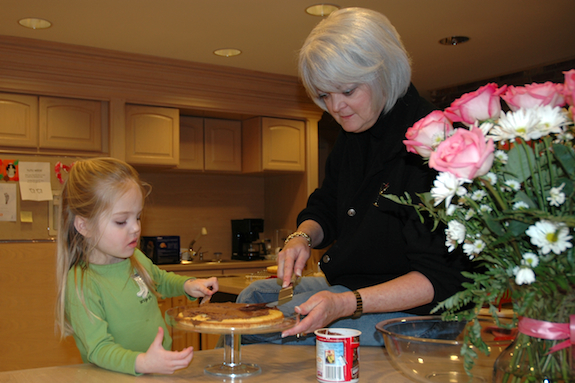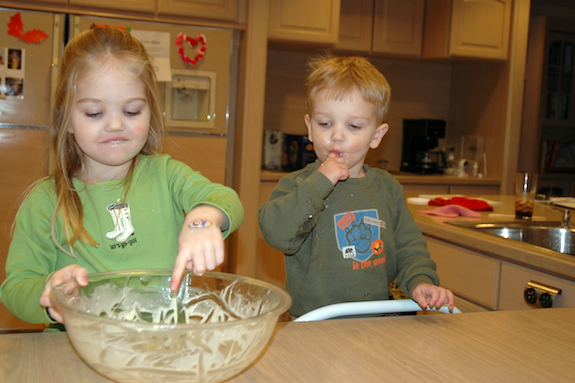- When grandma comes in for a new baby’s birth, she gets carte blanche to frost cakes with store-bought frosting.
okay Jill! time to call in the experts…you! HOW DO I HANDLE TWO CHILDREN AND COOK SUPPER…HELP!
This message was posted on my Facebook wall a few weeks ago by my friend Holly, who lives in South Carolina. She just had her second baby. So I’m donning my super-hero spandex body-suit and I’m here to help!
Let’s break this situation down. There are special challenges to dealing with the birth of a new baby, especially:
• Massive sleep deprivation
• Hormone-induced insanity
• Chaos and disorder
• New levels of neediness from the little prince or princess who suddenly has to share his or her realm
• Pain and discomfort as your body recovers from the brutality of pregnancy and childbirth
But let’s be honest, there are also some advantages:
• You may have folks who are staying with you to help. If you’re really lucky, they have some basic cooking skills.
• You may have kind neighbors and a church or school community that brings you meals for a while.
• Newborns sleep a lot. You don’t really realize it with baby #1, but by baby #2, you’re wondering what was so crazy-making about that first one.
In many ways, you’ve never needed a great foodlife more than you need it now. Your healing body needs nutrition. You need energy: crappy food will drag you down and nutritious foods will perk you up. If you’re nursing, baby benefits from good food and exposure to the flavors that come with eating a varied diet. Your family has been catapulted into mayhem by a selfish little ball of flesh, whose head you cannot stop smelling and fingers you cannot stop kissing. A few communal moments can bring a bit of peace to family life
It has never been harder to have a decent foodlife.
I learned to eat well slowly over the course of four pregnancies. With each new baby, things were a bit better than they were before. My cooking skills improved. I was developing a bit of a system for meal planning. My understanding and appreciation of fresh ingredients was developing. This was good news and bad news. I was better equipped to cook nutritious food. But I couldn’t go back to eating crap.
When I was pregnant with my fourth, Penelope, we moved from Connecticut to Chicago. I was just starting to feel a bit settled in when I started my third trimester with its heaving weightiness. The intensity of the move combined with the cumulative effect of four pregnancies in five years created a condition that made it very painful for me to be on my feet for any amount of time. No matter how you try, cooking is really hard to do when you’re sitting. A few weeks before I knew I would deliver, I convinced myself that eating frozen prepared meals for a few weeks wouldn’t materially impact our well-being.
Much to my surprise, we couldn’t do it. I spent hundreds of dollars stocking up my chest freezer with the frozen stuff. We subsisted on it for a week, maybe two. We were all miserable. I gave the frozen taquitos and lasagnas away and went back to cooking. I practically never skipped a beat after Penelope came home with us. I’d learned my lesson that I just had to change my cooking habits for a little while, rather than abandoning my chef’s knife altogether.
There’s no magic formula, but these are the things I learned that made it doable for me with four kids and, for a while, a lot of pain.
Keep it super simple:
• No new recipes. Stick with what you know.
• Use quality fresh ingredients prepared simply. This will give you the best flavor for the least effort. It’ll also give you the best opportunity for nutrition.
• If you are not accustomed to cooking nightly, keep your meal plan simple. Even if you have two home-cooked meals a week and eat pizza every other night, you’ll get a calming, energizing benefit from the good nights.
• Plan ahead: Shop once a week at most so you can put it out of your mind. The good news is that the newborn sleeps so much and is so darned portable. Park that kid in his carseat in the shopping cart or carry him on you. He’s just like a heavy handbag- that sometimes cries.
• Simple menus that work with a newborn in tow include: cheeseburgers with oven-fries and a small green salad; roast pork loin with pan gravy, mashed potatoes and garlic sautéed greens; sautéed red snapper with lemon and herbs served over brown rice with roasted carrots; thyme-roasted chicken with steamed cauliflower and broccoli drizzled with lemony olive oil; any kind of homemade soup. It’s about minimal prep and simple execution.
Plan for baby’s needs
• Once baby has established a bit of a rhythm, plan dinnertime- as much as possible- around that schedule, even if it means eating a little earlier or later than usual. Alternatively, if baby has a time when she takes a long nap, prep or even cook dinner so that you’ll be less stressed around dinnertime. All of my babies had a “witching hour” between 4 and 7PM when they were hard to settle down and wanted to nurse a lot. It was a lot easier to do the bulk of the work for dinner at 2PM rather than 4.
• Put baby in a sling while you cook. I couldn’t be a bigger advocate for this deceptively simple contraption. I called it my “fourth trimester.” One of the most wonderful things about it was the way that it enabled me to cook during the witching hour. When baby needed some momma time- I’d just pop her into the sling. She’d settle into bliss listening to my heartbeat and feeling my breathing. I could then continue with dinner with her safely tucked into the security of the sling. You can’t pull this off with a front-carrier; dangling legs and exposed, delicate flesh do not belong in close proximity to hot oil and cutlery.
• If you can do so safely, put baby up on the island where you are cooking so she can see your face. This is delightful time for you to make goo-goo eyes at each other as you peel carrots. Having baby in front of you frees you from worrying that your older child might be trying to use the baby as a human piggy-bank and helps keep baby settled. To eliminate the possibility of a jealous sibling accidentally knocking the baby off the counter, I put a piece of non-skid carpet pad underneath the very stable platform of my infant seat. Also, be aware of lights that might be glaring right in baby’s face.
As for your bigger baby:
• I absolve you of your guilt for putting your child in front of the TV so that you can spend a half-hour making dinner. Call it “quality time with Dora the Explorer.” Tell yourself that your child is building fantastic neural networks in the language center of his brain because of this meaningful exposure to Spanish. This is just a stage for you all and you can go back to being super-mom to him as soon as you relinquish bras with trap doors. I promise his chances of becoming a NASA engineer will not be compromised by the TV time he clocks over these few months.
• When you’ve got a little extra energy and really need a gold star, make some quality one-on-one time over dinner prep. I can’t say enough about how positive this time is for you and your children. It’s like a craft time that teaches your child endless lessons about the value of food and its infinite variety. For older children it is also a great way to get them to talk: performing tasks together has a magical way of getting them to open up about anything from feelings that their teacher might not like them to questions about how God can allow suffering in the world. Don’t focus on how well they do the job. Let your perfectionism go down the disposal with the peelings and scraps. Enjoy this time with your child and the pride she feels in being part of feeding her family.
A few other pearls of wisdom:
• When people offer to bring you meals, accept. Don’t throw out an, “Oh, we’ll be fine.” First, it offers a blessing to the giver: it is a pleasure to be able to help the people you care about. Second, you and your family really can use the help. Third, older children see a wonderful model of community when they are fed by the generosity of others.
• When people ask about your tastes, be honest. Don’t say, “Oh, we pretty much eat anything,” if you hate processed food or only eat organics. Expressing your tastes graciously offers the givers a better opportunity to help you.
Make peace with your lack of control. Enjoy the things that are lovely in the moment that they offer themselves. Put out of your mind the way things “should” be or the way you wish they would be. This is the difference between the happy and miserable parents.

